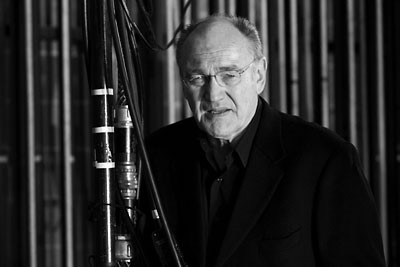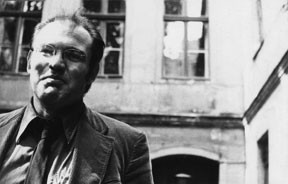Raconteur David Bathrick closes a Cornell career and prepares to return to Germany
By Franklin Crawford
"The trouble with David (Bathrick) is that he does a much better job telling his own stories than anyone else ever could. This means talking about David ... is not nearly as much fun or as instructive as talking with him."
– Leslie A. Adelson, Cornell professor of German studies, "The Trouble With David: Reflections on a Champ," New German Critique, No. 95, 2005, Special Issue for David Bathrick.
Caveat emptor, then, dear reader:
According to David Bathrick, some time in 1942 a Nazi U-boat crept undetected into Long Island Sound and prowled up the Five Mile River to Darien, Conn. It vanished having caused no obvious harm. The U.S. government tried to keep it secret, but the people of Darien learned about it, were outraged and held a town meeting. Their actions were swift and decisive.
"They canceled the instruction of the German language in the schools, which is why I never learned German then," says Bathrick. "I always thought it was a wonderful example of idealism: 'We'll stop them -- we won't speak their tongue!'"
That never stopped Bathrick, who was a child in Darien at the time. The Jacob Gould Schurman Professor of Theatre, Film and Dance and professor of German studies at Cornell went on to a remarkably colorful and successful career in his chosen fields. He is moving to Bremen, Germany, after 20 years here – and 17 years prior at the University of Wisconsin-Madison. During that time he's become a scholarly icon, loved and beloved by those who know him and work with him, and, for his involvement with the German SDS and the New Left in Madison, alternately fingered by the Stasi in Communist East Germany and by the FBI at home.
All that was ahead of him in the transformative year of 1954, when Bathrick spent a summer in Berlin living with a German family as part of the American Field Service high school exchange program. He was headed for Dartmouth by then, and the Berlin experience changed his life. He dropped out of Dartmouth between his sophomore and junior years and went back to Germany to study at the Free University of Berlin and in Munich. He bought a motor scooter and tooled around Europe, playing rugby (he was a 217-pound star lineman on the Dartmouth football team) and soaking up the culture -- of Berlin, especially.
"It was just a fascinating place -- it was before the wall -- and so I was constantly going into the East. You learn history in incredible ways when you're in the center point of a hot spot. And I just knew I would go back there."
The chronicle of Bathrick's remarkable academic career can be found in his curriculum vitae (see below). Or far better yet in the 2005 issue No. 95 of the New German Critique (NGC) that's dedicated to him (available through Telos Press – Telospress@aol.com).
And yet, other, let us say "very intriguing," facets of the man's background can be found in a Stasi file under the code name "Diablo." Stasi is short for Ministerium für Staatssicherheit, or the secret East German police.
In 1982 Bathrick, who was by then a professor at the University of Wisconsin-Madison, was an exchange professor at Humboldt University in Communist East Germany, there as part of the IREX program. IREX, founded in 1968, is a U.S. nonprofit organization committed to international education. By then, there was, of course, the Berlin Wall. And Bathrick was close friends with many of the usual suspects in any communist society -- academics, dissident intellectuals and artists. Years later Bathrick learned from a German colleague that there was a Stasi file on him. He now has a copy of it, 240 pages long.
According to Bathrick the Stasi had a couple different theories about him: He was a trained spy. He had served in the Marines and the Army reserves (at Dartmouth under a program similar to ROTC); coincidentally his father-in-law at the time was a high-ranking CIA official. Enough said. Bathrick's objective, the file states, was either to poison the East German water supply or to infiltrate and ideologically overthrow the German department at Humboldt. Or both.
The other conclusion about Bathrick was that he was exactly who he said he was, a neo-Marxist leftie professor from Madison – which in those days was bad enough, whether in the Midwest or in the German Democratic Republic.
Bathrick, whose gleeful joy at the absurdity of the matter is expressed with a devilish laugh worthy of his Stasi code name, said he could identify the informant by his conspicuous absence from the file reports.
"To my great relief I realized that the people whom I cared about the most were not spying on me. It was comical and it was horribly sad – people really were spying on their own families."
From his year in East Germany came "The Powers of Speech: The Politics of Culture in the GDR" (1995), for which he was awarded the prestigious 1996 DAAD/GSA Book of the Year Prize.
Adelson's right: Bathrick is a raconteur of the first rank –- and a thespian. As his fascinating experiences unfold, it is easy to forget that he is a major figure in German studies, cultural studies and theater and film studies, as well. Who does not want to hear more about his time sheltering Mark Rudd and the anarchic radical Weather Underground crashing at his Chicago home, with Bathrick finally booting them out because they were stealing his morning newspaper and dropping LSD? There is an FBI file on Bathrick, and one of these days he is going to get hold of that and write a book, he says, perhaps critically comparing and contrasting his two secret dossiers.
On the Cornell side (he joined the faculty in 1987) it is just as interesting to learn that he was Cornell Provost Biddy Martin's teacher at Wisconsin, and they have remained lifelong friends and colleagues. Martin's moving tribute to her mentor, "The Work of Love," also was published as part of a Festschrift in the NGC. The interdisciplinary journal of German studies, co-founded and co-edited by Bathrick, brought the Frankfurt School into the center of German studies in the United States and continues to influence the field.
"In his life as a scholar, teacher, editor, administrator and, above all, a character, David Bathrick has integrated life and intellectual work," writes Martin. "Not by making overdrawn claims to their equivalence, but by producing and living their interpenetration."
Indeed. How about Bathrick's time working with the Berliner Ensemble as an apprentice director? An important part of Bathrick's expertise on German playwright Bertolt Brecht came from that experience as well as his own work as an actor and led to his Ph.D. thesis written while a graduate student at the University of Chicago and published in book form as "The Dialectic and the Early Brecht."
And then there's his appearance on the 2004 PBS American Experience special "The Fight," where Bathrick holds forth on Max Schmeling with equal insight into the "sweet science" and the historical ramifications of the German boxer's momentous rematch with Joe Louis in 1938 and "what Schmeling meant as an icon for Weimar culture."
But wait ... Bathrick knows about boxing, too?
"From the age of 6 I was a completely obsessed boxing fan – to the absolute horror of my mother. I would sneak the family radio into my bedroom at night and listen to Don Dunphy calling the blow-by-blows. I boxed a little myself, not much."
Yet when he demonstrates the flaw Schmeling spotted in Louis' jab, Bathrick looks like he could hold his own in a dark alley.
Or how about the time that Bathrick –- oh. Gosh. Adelson is right. The man is a book, best on audio, narrated by the subject himself.
He's going to miss Ithaca, he says. He will dearly miss his friends here. And the "extraordinary intellectual life of Cornell University as exemplified by the Society for the Humanities," he says. But he's coming back to Cornell next summer to teach a DAAD seminar for college teachers. And in the fall 2008, he has organized an international conference on literature and media co-sponsored by Cornell and the University of Bremen, in which he and his wife, Ulrike Liebert, a professor of government at Bremen, will be participating.
He's now about three-quarters through a book about film and the holocaust, examining films from the Third Reich as well as newsreels and lesser-known films from the 1940s and '50s.
Then there's the ongoing project between Bremen and the Cornell University Library to digitize 22 interviews between seminal German intellectuals Alexander Kluge and Heiner Müller.
Retirement? Hardly.
"I'm just going to keep doing what I've always been doing until my head stops functioning – and that's one of the great privileges of being an academic."
What else to say, then, but "auf Wiedersehen, Diablo."
The CV side of David Bathrick
David Bathrick, the Jacob Gould Schurman Professor of Theatre, Film and Dance and professor of German studies at Cornell, did his graduate work at the University of Chicago, where he received a Ph.D. in Germanic languages and literatures in 1970.
He was a professor of German at the University of Wisconsin-Madison from 1970 to 1987, when he joined the faculty of Cornell. Bathrick has been a visiting professor at universities in Germany and the United States. He was chair of Cornell's German studies department from 1991 to 1994 and chair of the Department of Theatre, Film and Dance from 1995 to 2002.
His publications include "The Dialectic and the Early Brecht" (1976), "Modernity and the Text" (1989, co-edited with Andreas Huyssen), "The Powers of Speech: The Politics of Culture in the GDR" (1995), for which he was awarded the 1996 German Academic Exchange Service (DAAD)/German Studies Association Book of the Year Prize, and numerous articles on the theory and history of 20th century European culture.
He is a co-founder and co-editor of New German Critique, an interdisciplinary journal of German studies. His areas of specialization include the history and theory of modern drama, 20th-century German literature, critical theory, Weimar culture, the cultural politics of East Germany, European film, Holocaust studies and Nazi cinema.
Media Contact
Get Cornell news delivered right to your inbox.
Subscribe

